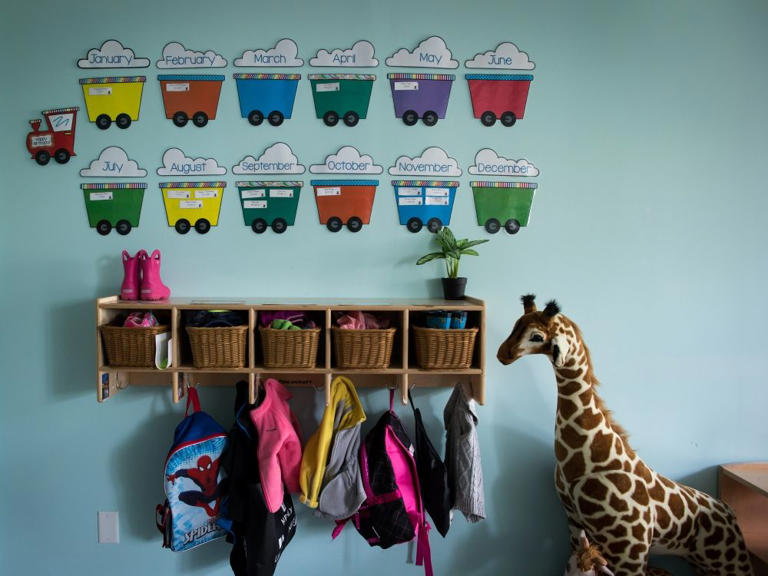ALBERTA FREEZES PRIVATIZED CHILD CARE FUNDING
Matthew Lau: The Alberta government's disastrous child-care takeover

Children's backpacks and shoes are seen at a daycare in Langley, B.C.,
The government takeover of child care is a full-blown crisis in Alberta, with many of the province’s child-care entrepreneurs saying they are being pushed to the brink.
They have until the end of January to sign the provincial government’s new agreement, but its terms give child-care operators “serious concerns for financial viability moving forward,” says Krystal Churcher, chair of the Association of Alberta Childcare Entrepreneurs (AACE), in a letter co-signed by the Canadian Federation of Independent Business (CFIB) and addressed to Searle Turton, Alberta’s minister of children and family services.
Even as the government pours increasing sums of taxpayer money into the sector, child-care operators are suffering from a government-imposed revenue cap in the face of inflating expenses, a lengthy delay in receiving revenue and heavy administrative and audit expenses required to participate in the government program.
Opting out of the government program isn’t a great option either because it means competing without subsidies in a sector awash in government funding while also paying the same taxes that pay for everyone else’s subsidies.
One child-care entrepreneur, Christine Pasmore, who has managed her facility for 18 years and serves over 120 children, told me this week that “it is virtually impossible for my centre to remain financially viable under the new agreement.” She added that the situation is made worse by the heavy administrative burdens of the program.
“While the government emphasizes that child-care centres have the option to participate in the program or not, the reality for many operators is a stark choice between immediate bankruptcy by not signing in or a slower path to financial ruin by participating,” she said.
The new government agreement gives child-care operators a three per cent fee increase for 2024, but the baseline is artificially low because many child-care centres essentially froze fees coming out of the pandemic, and need 10 to 12 per cent revenue growth just to account for inflation.
On top of that, are the administrative burdens imposed by government. Child-care operators who participate in the government program must pay for mandatory financial audits, which for most centres will cost around $30,000 per year.
In her letter to the minister, Churcher noted that additional administrative expenses will come from paperwork, staffing and reporting. For her business specifically, she tells me the government-imposed administrative burden works out to $28 per child per month on top of the $30,000 audit fee.
Another child-care operator, licensed for 100 spaces in Calgary, told me this week that he estimates the government is wiping out about one-third of his centre’s income by limiting the growth of fees to three per cent and by imposing significant new costs.
“Operators have little control and little ability to fix things as our revenues are contractually restricted,” he told me.
A one-third cut to income is a calamity; for many other child-care centres, the negative financial impacts could be even worse. When revenues cannot rise to match expenses, even modest expense growth causes a severe reduction to margins and earnings.
The government’s stated goal is to make child care more widely available, but wrestling control away from operators and severely impairing the value of their investments is not going to help grow or strengthen the sector.
In addition to constraining revenue, government is imposing a massive liquidity burden on child-care operators by delaying funding. Instead of receiving fees at the beginning of each month, government reimburses revenues on a delay of 40 to 45 days, which places “an unsustainable burden on child-care operators,” the AACE-CFIB letter states.
It will lead to “severe cash flow problems, making it challenging to cover essential expenses like rent and wages on time, depleting savings and requiring reliance upon business loans” which increases interest expenses. While 40 to 45 days of delayed revenue might not sound like much, for many centres this is equivalent to the government borrowing something like two-thirds or more of annual net income, interest-free and on a rolling basis.
Responses to a survey from the AACE to its members, who operate about 250 child-care centres accounting for 30,000 spaces across the province, was appended to their letter to the Alberta government. When asked how they would cope with the funding delay, many said they would need to obtain bank loans or lines of credit: “borrowing money to fund the government,” as one operator put it.
Some operators are panicking, and have asked landlords to delay rent and staff to delay payroll. Others say they will have to close their businesses unless a swift course correction is taken by government. Indeed, without serious policy improvement, the government is destroying a vitally important sector. It is a disaster for Alberta’s child-care businesses, their staff and the families they serve.
National Post
Matthew Lau is a Toronto writer.
No comments:
Post a Comment